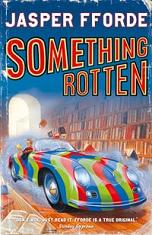Ellis Sharp describes the appeal of Philip K. Dick:
In the case of Philip K. Dick, I don’t find the prose that bad. Yes, sometimes it’s very tired and lazy. Other times it’s dazzling. And when it comes to writing fiction, style and gleaming prose isn’t everything. Think about (for example) Henry James and Robert Louis Stevenson. Henry James might well seem to be the better writer, with a massively accomplished oeuvre. But I would argue that ultimately he never wrote anything as important as what Stevenson achieved in The Strange Case of Dr Jekyll and Mr Hyde, which manages simultaneously to be a hugely accomplished piece of writing and a brilliant exploration of the contradictory nature of human identity and a very insightful account of Victorian society and its hypocrisies. And Stevenson arrived there by way of genre writing. Interesting.
Dick reminds me of Stevenson in some ways. He’s more than just a great storyteller. He’s very good on paranoia, alienation and the self under stress. I first discovered Dick’s work as a young teenager, when I read his early work Eye in the Sky. At one point the characters discover their genitals have vanished, replaced by nothing more than smooth skin. I found that very disturbing. Rather more disturbing than, say, Gregor Samsa waking up and discovering that he’s turned into a giant insect.
But Dick is also very good on ideology and social control. The world he describes in his fiction continues to resonate today. Official reality is a vast simulacrum, is it not? Wars for freedom and democracy. Celebrity gossip. Grinning royals and loyal, flag-waving subjects. Important writers and journalists.
What I require from any piece of fiction is: does the writer’s vision engage me? If so, is it true to itself as art? And is it true to the world? In the case of Philip K Dick the answer is yes, yes, yes.
It’s easy to dismiss Dick as either a talented science fiction writer, interesting but ultimately limited by his subject matter or as a kind of half-crazed creator of hallucinary nightmares, interesting for their novelty but irrelevant to anything else, but that would be missing the true strength of his writing. Dick’s ultimate concern is the nature of reality, whether there can be such a thing as a fundamental realiy underlying our lives or whether it’s all a construct, no matter how natural it may look. Being a
science fiction writer Dick went slightly farther in this than just making the usual banal observations of the artificiality of American life, by reveling in unreality and constructed realities, yet almost always with their roots in that banal artificiality of white American suburban life.
His early short fiction, collected a few years ago in five large volumes, is illuminating in this regard, in the sheer number of stories that take place in suburban surroundings where everyday features of life have taken on a nightmarish aspect. They show how his fantasies were always grounded in the concerns of the “real world”, the paranoia, insecurity, powerlessnness and claustrophobia of day to day life, no matter how absurd or grotesk they seem at first sight.
(Speaking of science fiction, I do wonder what Ellis made of last Saturday’s Dr Who episode, featuring a certain Elizabethan playwright he’s blogged about occasionally…)
